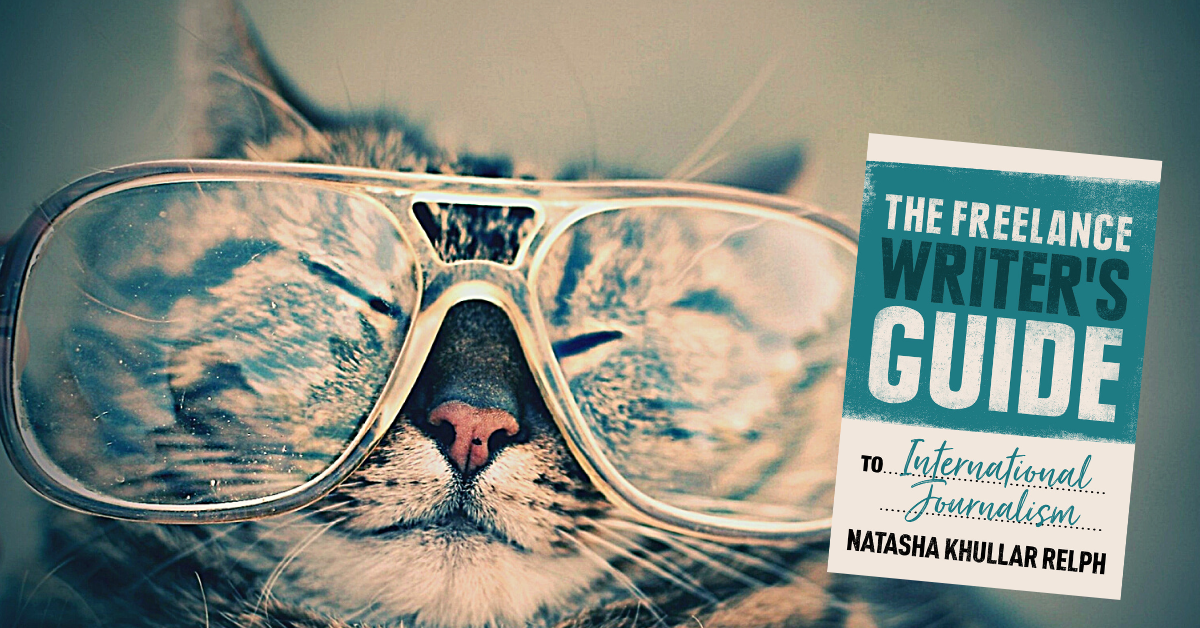

FROM THE EDITOR’S DESK
Hiya writer friends,
I’ve bitten off all my nails because I’m nervous. My Life in the UK test is tomorrow
and whether I continue living in this country or get booted out and sent back home to India depends on my knowledge of the population of the UK in the 1600s (among other not-so-useful things). I’ve been studying all week, and my editors have been wonderful. One sent me a new assignment and said he hoped it would provide a distraction. (It did!)
I quit a prestigious freelance gig this week. The client wanted me to be available at short notice for breaking news and travel, and had promised a story a week. You know where this is going—it ended up being a story a month, despite my sending half a dozen pitches they didn’t bother to look at. So, I ended it.
The reason I mention this is that some people (editorial clients, usually) are still shocked that a freelancer would walk away from assignments or bylines. Publishers and agents are still surprised when a writer has the gall to turn them down. (Ask me how I know.) The entitlement remains high.
I go over and above for the clients and editors I write for. In return, I expect the same level of thoughtfulness and respect.
Publications need writers. Businesses need writers. Our talents are massively in demand.
The only people I want to work with now—whether as a freelancer or in publishing—are people I feel fully and completely aligned with.
This is my business. And I’m incredibly picky about who gets to play in it.
Enjoy the issue!
Natasha Khullar Relph
Editor, The Wordling
P.S. Enrollment for 30 Days to Freelancing Success closes tonight. Get in now so you don’t miss out.
NEW ON THE WORDLING
If you were starting out as a freelance writer and asked me for a step-by-step plan, I’d give you this.
The easiest way to write more than you’ve ever written before.
IN THE NEWS:
The AI lawsuits have arrived
It’s a question that’s been on everyone’s mind: When AI tools for content creation soar in popularity and the data they’re relying on is pre-existing work from artists and writers, is a lawsuit around the corner?
Well, it was.
And now it’s smack bang in the middle of the road.
What’s going on?
Earlier this month, Getty Images filed a lawsuit against the creators of AI art tool Stable Diffusion for scraping its content. Individual artists are suing, too. Three artists—Sarah Andersen, Kelly McKernan, and Karla Ortiz—“have filed a class-action lawsuit against Stability AI, DeviantArt, and Midjourney for their use of Stable Diffusion, a 21st-century collage tool that remixes the copyrighted works of millions of artists whose work was used as training data.”
Listen, AI is here, whether you like it or not, whether you use it or not. If you use ProWritingAid or Grammarly or Otter, you’re already using AI in your business. It’s just that now, with content creators, things have gotten trickier, legally speaking. This is because the data that’s being scraped to train the AI is original work by creators, many of whom are not happy about it.
“Stability AI’s use of intellectual property of others—absense permission or consideration—to build a commercial offering of their own financial benefit” is what’s at play here, Getty Images CEO Craig Peters told The Verge. “We don’t believe this specific deployment of Stability’s commercial offering is covered by fair dealing in the UK or fair use in the US.”
What you need to know
ChatGPT has put writers on edge, with many asking if their jobs are now at risk. That’s not the point. News organizations have already been using AI to produce real estate listings and cover sports. Data-driven work, such as quarterly earnings reports and the stock market, are easily tackled by AI and have been.
Will AI continue to get smarter and replicate more of what humans can do? Of course. But where AI will fail is in originality. It depends on data and content that already exists, so it can create more of the same.
If that’s your jam, you can learn how to use AI to help you in your work.
If it’s not, and you’re breaking creative boundaries with new concepts and ideas, AI won’t be a match and you can still use it to aid in your research, create templates, and help with outlines as you do the original work of creation.
Low-paid work is going away, yes. Originality isn’t.
What these lawsuits are helping do is determine whether that originality can then be used to train the AI—without permission or compensation.
ALSO SEE:
No one trusts journalists anymore, according to a survey that reveals that business leaders fare better. Ouch.
Meanwhile, Amazon is cutting 18,000 jobs, largely in its Comixology division. Comixology, which was acquired by Amazon in 2014, has more than 230,000 comics, graphic novels, and manga from top publishers, as well as a range of independently published comics and Comixology Originals.
And, finally, in the “Are you for real?” department, an independent school district in the US canceled bestselling author Emma Straub’s visit because she used the “F” word online, something that “does not align with our school and community’s values.” In May 2022, following the Uvalde school shooting, Straub had tweeted: “Fuck guns, fuck people who care more about controlling women’s bodies than protecting all of us from people with guns, fuck! It’s too much. So heartbroken.”
THE FREELANCE WRITER’S GUIDE TO
International Journalism
The Freelance Writer’s Guide to International Journalism demonstrates how to make a real living writing for newspapers, publications, and clients across the globe.
What you’ll learn:
- Why expat journalists get the work that local journalists don’t (and how to change that.)
- How to use your location to your advantage.
- Forming relationships with editors and writers when you’re in different time zones.
- How to use international grants and scholarships to get funding for your stories and reporting.
WORDLING INSIGHT
Is what you’re doing working?
If yes, do more of it.
If not, change it. Do something else. Keep doing new things until something works. Then stick with it.
GLOBAL REPORT
AUSTRALIA: “Senior journalists and editors from across the media industry have written to the federal court in “dismay” at its decision to restrict access to crucial documents, saying the shift “contradicts principle of open justice”. The federal court last month enacted new rules limiting access to documents for non-parties until a case’s first directions hearing, a rule that would considerably delay media access to key information about proceedings.”
ITALY: “The Italian news media suffers from a dearth of data on the state of the profession. Add to it the citizenship laws that favour the Italians and an overall failure of the country to recognize minorities, and you are left with a profession that is dominated by one race and one gender.”
NIGERIA: “For the past five years, Crusaders Radio has focused on shedding light on civil and human rights abuses in the state. Through its reporting, the radio show has helped groups — especially the less privileged — receive justice. During the independent radio show, which today has over 70,000 listeners, listeners submit complaints which are then discussed and resolved on air.”
QUOTE OF THE WEEK
“I have a personality defect where I sort of refuse to see myself as an underdog.”
– Mindy Kaling
SHARE THE WORDLING
And make us happy.
Because if you’re reading, you love it, right?

